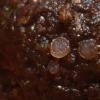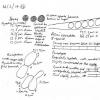
26-02-2026 15:00
Me mandan el material seco de Galicia, recolectada

24-02-2026 11:01
Gernot FriebesHi,found on a branch of Tilia, with conidia measur

23-02-2026 11:22
Thomas Læssøehttps://svampe.databasen.org/observations/10584971

29-11-2024 21:47
Yanick BOULANGERBonjourJ'avais un deuxième échantillon moins mat

07-02-2023 22:28
Ethan CrensonHello friends, On Sunday, in the southern part of

19-02-2026 17:49
Salvador Emilio JoseHola buenas tardes!! Necesito ayuda para la ident

19-02-2026 13:50
Margot en Geert VullingsWe found this collection on deciduous wood on 7-2-
Possibly Ascobolus brassicae or Pseudombrophila bulbifera
Peter Thompson,
18-02-2014 12:34
I have found a brownish operculate discomycete growing on rabbit dung.
I have had a look at previous postings on Ascofrance and think that either Ascobolus brassicae or Pseudombrophila bulbifera are the likely options. There is, however, a distinctive characteristic of my collection which I can not find in the literature - mature spores become brown in lugol.
An image of the fruit bodies is attached, along with a drawing of the microscopy. I have looked at two apothecia and the second had distinctly purple warts on the spores, whereas in the first sample the warts did not look purple. All other characteristics were the same in the two samples. Purple colouration is, of course, more likely in Ascobolus.
Pseudombrophila dentata seems to be ruled out by spore diameter.
I would be grateful for confirmation of one of these, or alternative suggestions for my sample.
Thank you,
Peter Thompson.
Michel Delpont,
18-02-2014 15:12

Re : Possibly Ascobolus brassicae or Pseudombrophila bulbifera
Hello Peter.
In my opinion it is Ascobolus brassicae. Have you controlled the reaction of asci with Melzer, positive or negative?
Michel.
In my opinion it is Ascobolus brassicae. Have you controlled the reaction of asci with Melzer, positive or negative?
Michel.
Peter Thompson,
18-02-2014 16:06
Re : Possibly Ascobolus brassicae or Pseudombrophila bulbifera
Hello Michel,
The Melzers reaction is negative on both the ascus tips and the spores.
I am also seeing some paraphyses which are branched at their tips.
Both characteristics are consistent with Ascobolus brassicae.
With Best Wishes,
Peter.
The Melzers reaction is negative on both the ascus tips and the spores.
I am also seeing some paraphyses which are branched at their tips.
Both characteristics are consistent with Ascobolus brassicae.
With Best Wishes,
Peter.

